#Article 50
Text
Formal apology on behalf of the United Kingdom to the people of the European Union regarding Brexit and a gesture of hospitality
Dear People of the European Union,
I am writing this letter for and on behalf of the United Kingdom to extend our heartfelt apologies for the impact of Brexit on the people of the European Union, and for the personal insult, distress and uncertainty it has caused. I didn’t vote for Brexit, I voted to remain and I have had to learn to respect and accept the outcome of the referendum and it’s…

View On WordPress
#Apology#art#article 50#Austria#backstop#belgium#Border#border control#brexit#brexit deal#brexit impact#brexit party#brexit process#brexit vote#Bulgaria#citizens rights#conservatives#customs arrangements#customs checks#customs union#Cyprus#czech republic#Denmark#divorce bill#economic impact#economy#english channel#Estonia#EU#european union
1 note
·
View note
Text
Liz Truss’ first big parliamentary battle? Brexit (of course) – POLITICO
Liz Truss’ first big parliamentary battle? Brexit (of course) – POLITICO
2022-08-30 09:56:26
Press play to listen to this article
LONDON — Crossbench peers in the House of Lords are preparing a full-frontal attack on the U.K. government’s controversial plans to rewrite the Northern Ireland protocol when parliament returns from its summer break.
At a crunch meeting behind closed doors next week, senior peers — including leading ex-judges and barristers — will agree…

View On WordPress
#Article 50#Brandon Lewis#brexit#Conservative leadership election#Courts#France#human rights#Igor Judge#Ireland#Jenny Chapman#Liz Truss#markets#Negotiations#Northern Ireland#parliament#Policy#regulatory#Rights#trade#United Kingdom
0 notes
Text

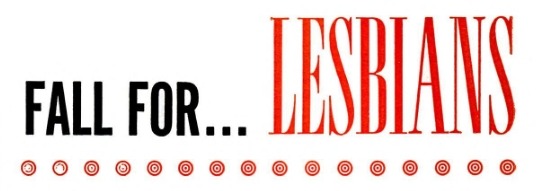
Jet (February 25, 1954)
133 notes
·
View notes
Text
I've been looking at this map of the Roman Empire for a long time and I still have no idea what the fuck is going on with it. This is literally from Time Magazine. There is no way they can screw up so badly with a map.

So the red means "at death of Julius Caesar." Does that mean the land Rome had at the death of Caesar? No it can't mean that, because Roman land during 44 BC was certainly not made up entirely of Egypt, North Spain, and a bit of Central Europe. Rome didn't even have those yet.
Maybe it means land that was acquired after the death of Julius Caesar and before the death of Augustus? If they meant that, I think they should've said that, but it doesn't matter. If that's what they meant, it seems to make some sense.
So the orange means "at death of Augustus Caesar." They certainly didn't have all that in the East at the death of Augustus! So maybe it means land that was acquired after the death of Augustus and before the death of Trajan? Which (not including the Britain-sized elephant in the room) seems to make some sense.
But the brown means "at death of Trajan." What does that mean now? The Romans certainly did not acquire Italy after Trajan died! This ruins the entire pattern I was setting up!
I thought maybe the colors were just mismatched, but I have no idea how to match them back up. I thought maybe orange was supposed to mean "at death of Trajan," and red was supposed to mean "at death of Augustus," and that seems okayish enough (cough cough except britain).
But the brown can't mean "at death of Caesar," because they didn't have that much Britain in 44 BC! Or that much Germany.
(I'm just going to ignore how the Roman Empire is depicted as having both all that Britain and all that Germany at the exact same time... maybe the map is just depicting the land in Germany to be permanent to make it more simple. But if the color of lands acquired is supposed to change at Augustus' death, then Germany and Britain can't be the same color!)
Now that I look closer, what's that Galatia-shaped hole doing there in the East? Why isn't it colored in at all?
But, the brown. What's going on with the brown? Is there supposed to be an extra color? I think the brown was likely supposed to be "at death of Julius Caesar," but then someone fumbled by adding all that extra land especially in North-West Europe.
Maybe I figured it out? What the map is trying (poorly) to say? Brown is (attempting to be) death of Caesar. Red is (mostly) death of Augustus. And orange is (mostly) death of Trajan? Which is absolutely not what the key says but oh well.
But, if I'm right, how did all that slip through the cracks? How did someone make a map so poorly? How did everyone who looked it over give the green light? I must be misunderstanding what the map is trying to say. It's probably obviously correct to everyone else.
But, there's no way I'm the problem. What Roman Empire growth map shows Italy and Britain as the same color, but Egypt as a different color? I just don't understand what happened. Who made that map?
#it cant be that wrong!#im a single canadian teenager who studied ancient rome for a year just for fun#meanwhile the people making that article probably have 50 times more qualifications than me#but#i cant figure out a world in which this map is right#im at a loss for words#ancient rome#maps#roman emire#times magazine#roman history#misinformation
54 notes
·
View notes
Text

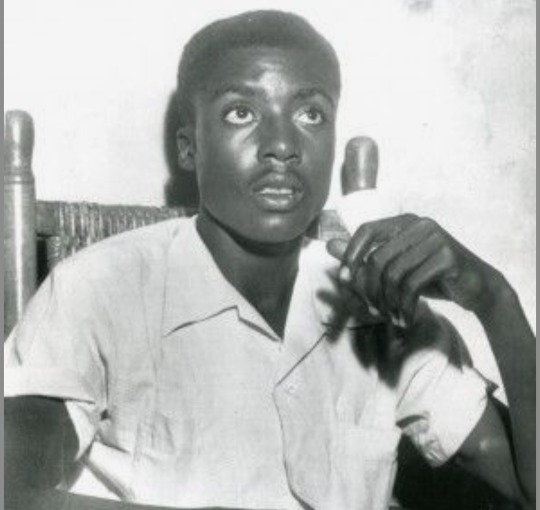
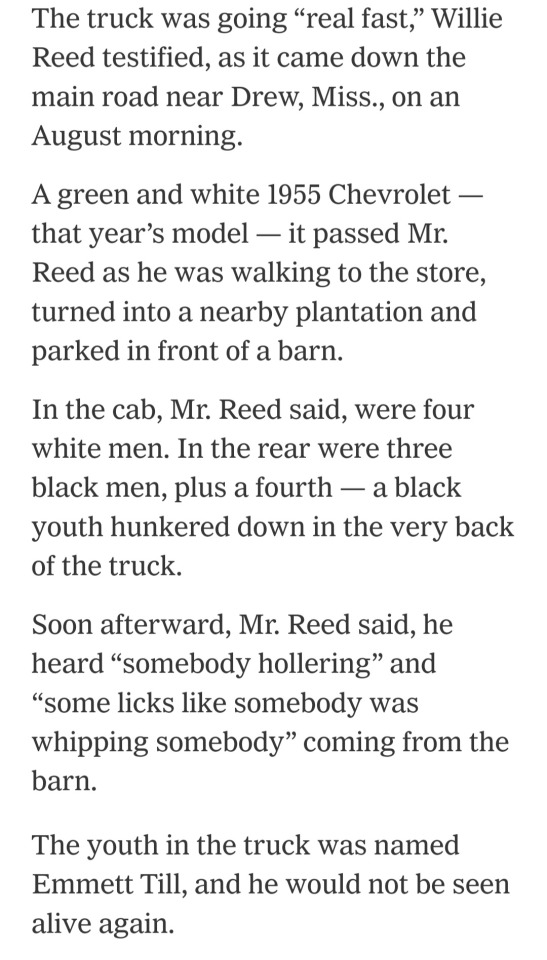



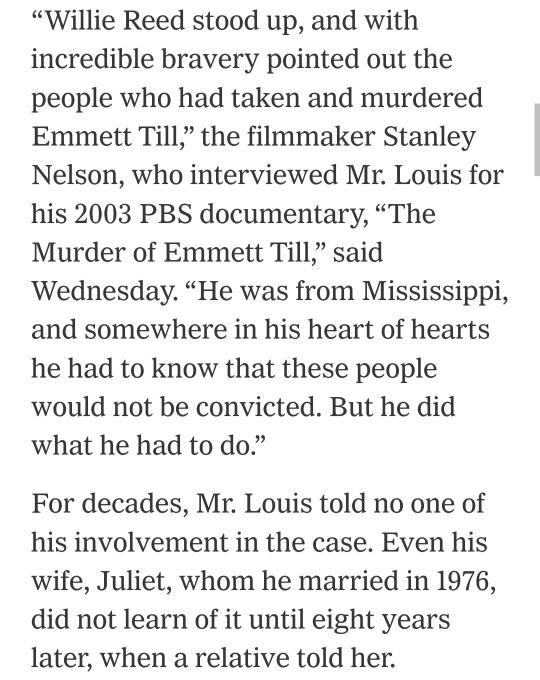
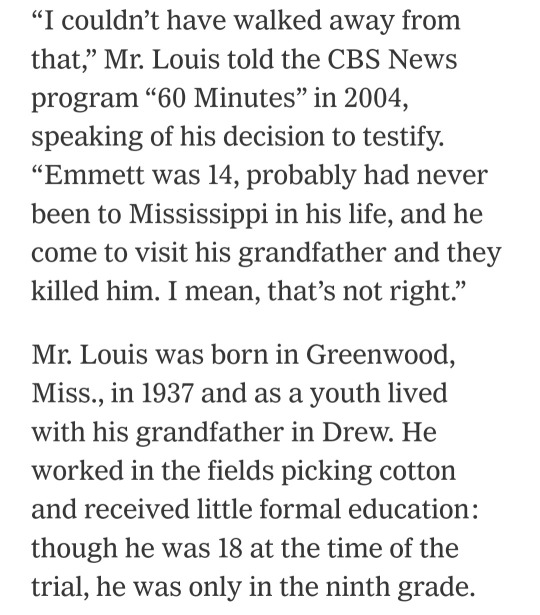

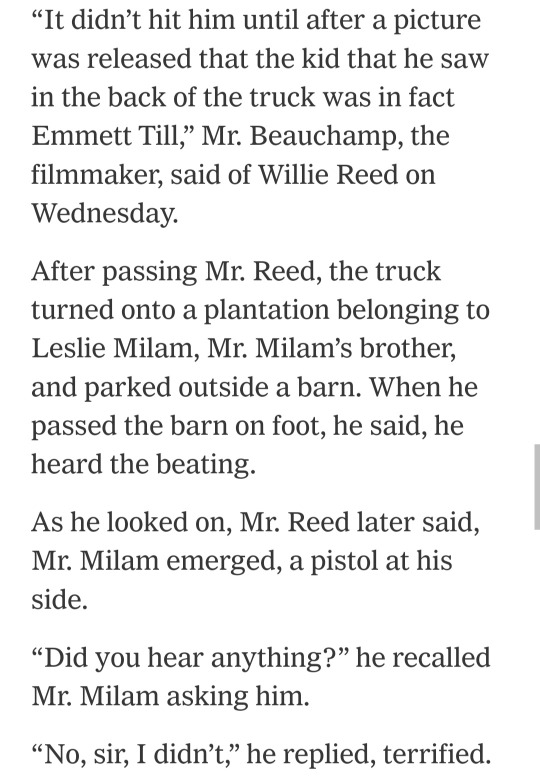
"He was really the best eyewitness that they found," David T. Beito, a historian at the University of Alabama who has written about the Till case, said Wednesday. "I don't want to diminish the role played by the other witnesses, but his act in some sense was the bravest act of them all. He had nothing to gain: he had no family ties to Emmett Till; he didn't know him. He was this 18-year-old kid who goes into this very hostile atmosphere."
The trial opened September 19, 1955. On September 23, the all-white jury, after deliberating for 67 minutes, acquitted both defendants.
Mr. Reed's testimony, Professor Beito said, was no less valuable for that.
"The prosecution - and this is not emphasized enough - was arguing a conspiracy case," he said. "They were arguing that more than two people were involved in the crime, that it wasn't just Milam and Bryant. And Reed's testimony was that it was a crowded pickup."
The other white men in the truck were believed to be cronies of Mr. Milam and Mr. Bryant, the black men employees of Mr. Milam who were forced to take part in the crime. None of the other men, black or white, was ever charged.
With the aid of T.R.M. Howard, a prominent local black doctor and civil rights advocate, Willie Reed was sent to Chicago, where he was given round-the-clock police protection at first. But the terrors of the crime and trial overtook him, and he was hospitalized with a nervous breakdown.
For years during their marriage, Mr. Louis suffered from nightmares, Juliet Louis told The Associated Press.
J.W. Milam died in 1980, Roy Bryant in 1994. In a 1956 article in Look magazine for which they were paid, the two men admitted to having murdered Till.
114 notes
·
View notes
Text



On November 17th of 1973 David Bowie met William S. Burroughs. A few months later their conversation would be published in Rolling Stone.
photographer: Terry O'Neill
#50 years ago today#david bowie#william s. burroughs#today in history#bowieposting#70s music#the rolling stone article is available online to read if anyone's curious
101 notes
·
View notes
Text
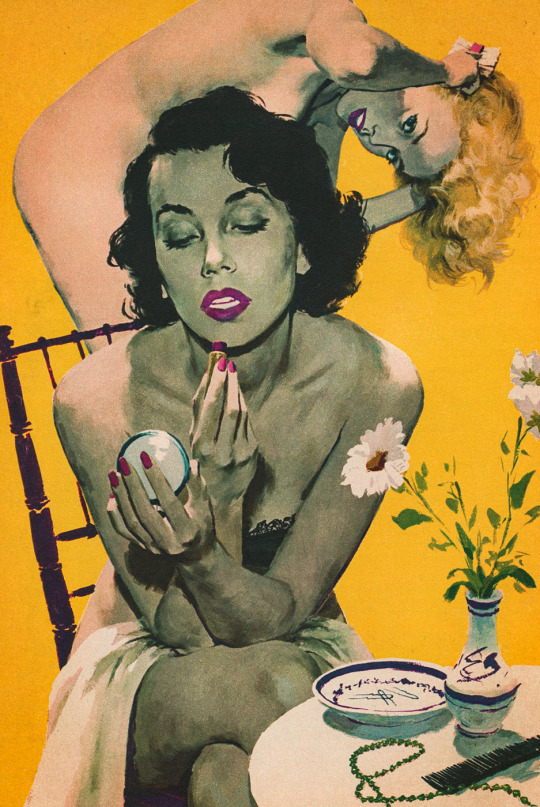
“Naturally, I love him for what he is - filthy rich.”
#vintage illustration#vintage magazines#magazines#illustration#illustrators#artwork#magazine illustration#the 50s#the 1950s#gold diggers#esquire magazine#magazine articles#magazine stories#pulp fiction#fiction#short stories
32 notes
·
View notes
Text
In case anyone else has the brain worm that makes them want exact details anytime people talk numbers, in Too Much Birthday the offer to buy Kendall out says that he has 12,904,663 shares of Waystar (worth ~2bil at $156/share), so assuming he didn't sell any stock after that and also that Shiv and Roman all had an equal stake, which the show implies, that means that when they sell the company at $192/share in the finale, each of the siblings gets just under $2.5 billion, half of it in Gojo stock, not counting whatever they inherit from Logan.
#this is way higher than the combined 3 bil they say they said they'd have when they're trying to buy Pierce but the deal is#a 50/50 stock cash split so that doesn't factor in the $$$ they'd get in gojo stock plus its before ATN is valued in#i did some googling earlier out of curiosity but all of the articles/posts about their actual net worths either use old info#or guesstimate the number of shares the kids have based on other things the show tells us or are just straight up#inaccurate even to the info they had and none of them actually used the pretty significant info we get in that doc#their actual net worths are obviously a bit higher than this since we know they own property and it doesn't account for any#other investments or what they may have inherited from Logan (which also likely includes more stock) but waystar stock is#definitely the majority of what they have value wise so the only unknown that would make their net worths significantly#higher than this (when the scale is billions) is any stock they may have inherited from logan#succession#roman roy#shiv roy#kendall roy#connor roy#siobhan roy
22 notes
·
View notes
Text
Calling it right now everything that Nandor tries to change about his bride this season is really just him trying to turn her into Guillermo
#Will he realize this? 50/50 chance#but it will be made abundantly clear to the viewers#we’re playing the long game besties hang on tight#that one article has me Thinking#nandor the relentless#guillermo de la cruz#nandermo#wwdits#what we do in the shadows#mine
823 notes
·
View notes
Text


Pictures of Elvis as Clint Reno on "Love Me Tender" (1956) | "The Rainmaker" screen test in Hollywood (March 26-28th, 1956) + magazine article | On "Love Me Tender" production and premiere (November 15, 1956). 🎬



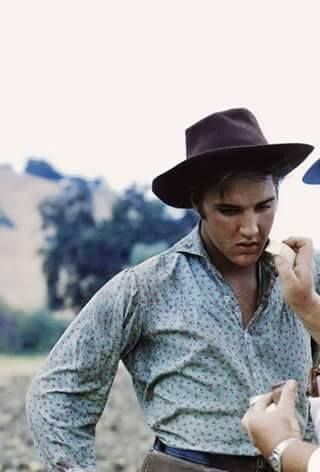
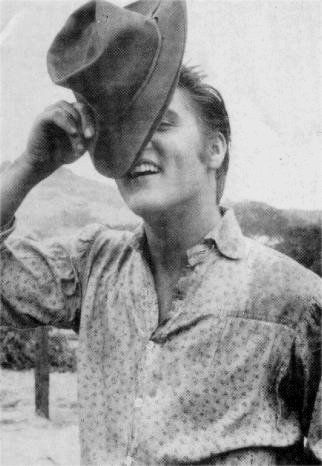

He had never even been in a school play, but he loved the silver screen and dreamed of seeing himself upon it. In April of 1956*, his chance arrived when legendary Hollywood producer Hal Wallis gave him a screen test. He was asked to read a part from 'The Rainmaker' with actress Cynthia Baxter, who later confessed that her initial reaction to working with Elvis had been "Ugh!" Afterward, however, Baxter said she found him "amazing to work with." Elvis told Wallis he didn't like the Rainmaker role: The character was too "happy, jolly, lovesick." Well, Wallis asked him, what kind of part would you like to play? "One more like myself," he said, "so I won't have to do any excess acting." Four months later (after Wallis and Colonel Parker had negotiated a three-picture-deal for $400.000) he was on the set of 'Love Me Tender' playing Clint Reno (seen here) — a passionate, naive young man, destined to die young.
*Elvis' Hollywood screen test was actually held, not in April but in March 1956, between Monday, the 26th and Wednesday, the 28th. Elvis would later say he memorized every line of the script of 'The Rainmaker' (not only his lines, the whole script!) in preparation for the screen test. A couple of months later, however, he told Robert Johnson of the Memphis Press-Scimitar that he had misgivings from the start about the character he would play. “It was a good part, but I just couldn’t see it for me. A good-natured, happy teen-ager, but with nothing up here. After I read the script, I just wanted to do another kind of part,” said Presley to the reporter.
This thing the magazine wrote about Elvis wanting "not to do any excess acting" is total bullshit. EP would never say such thing once he was so happy to kick off his acting career. He dedicated himself and wanted to make it as good actor. Elvis was excellent memorizing lines even before he was an actor, when he would memorize lines from all his favorite movies (such as 'Rebel Without a Cause'). Once he was indeed on the other side of the screen, filming his first movie, Elvis didn't miss the chance and talked to many veteran actors in hopes to have hints on how to make it better in front of the camera. He dedicated himself the best he could — and as the years went by, even so his roles were less and less interesting or challenging, sometimes even silly as he feared in the beginning of his career, Elvis achieved the goal in being a natural in front of those Hollywood filming cameras, and this is something absolutely undeniable. The thing about complaining of the role he performed on his screen test in 1956, probably had something to do with the image Elvis wanted to project onto his young audience, and that was not one of a "good-natured" guy.
Elvis wanted serious roles and, besides, he liked the 'bad boy' atitude James Dean and Marlon Brando had... the menacing glances, the defiant rebel posture. Elvis mentioned this to Lloyd Shearer, in 1956 during a photo session at the Peabody Hotel, in Memphis, Tennessee. Lloyd was photographing Elvis when the Presley politely asked the photographer to promise not to snap him "not even smiling slightly". His objection was explained with:
"I've made a study of Marlon Brando. I've made a study of poor Jimmy Dean [actor James Dean had recently died in a car crash]. I've made a study of myself. And I know why girls, at least the young ones, go for us. We're sullen, we're broodin', we're something of a menace. I don't understand it exactly, but that's what girls like in men. I don't know anything about Hollywood. But I know that you can't be sexy if you smile. You can't be a rebel if you grin. If you don't mind, let me pose myself." — Elvis, 1956.
On his screen test in March, 1956, Presley did two scenes from 'The Rainmaker' (and also was asked, and performed against his will since he didn't wanted to sing on the screen at all, to 'Blue Sued Shoes') Later that year, Elvis recalled the dramatic tests. “I knew my script,” he said. “I got out there and just tried to put myself in the place of the character I was playing, just trying to act as naturally as I could.”
In May, Elvis told Will Jones of the Minneapolis Tribune that he favored the second of the two scenes. “I took this screen test where I came in and was real happy and jolly and I didn’t like it. I did this other one where I was mad at this girl, and I liked that better — it was me.”
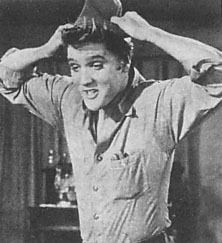

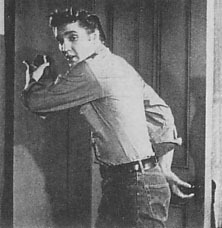
Elvis worked with veteran actor Frank Faylen in one test scene and with twenty-one-year-old actress Cynthia Baxter (later Cynthia O’Neal) in another scene.
She later told TV Guide, “When the Wallis people told me I was to make a test with him, my reaction was ‘Ugh!’ But, you know, he is a very interesting boy — kind of amazing to work with. As an actor, he has a lot of work ahead of him, but he has wonderful attributes to start with.”

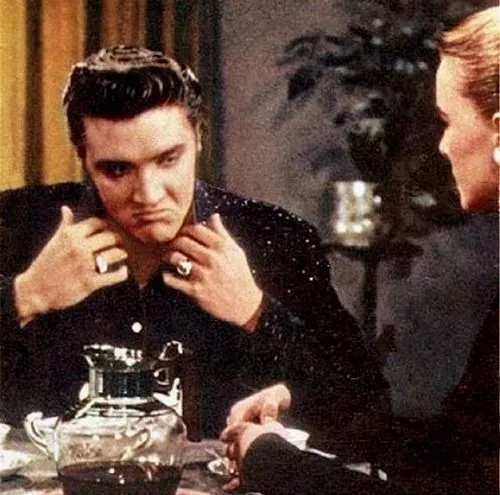
Actress Cynthia O'Neal (former Baxter). The picture (right) is the only still from 'The Rainmaker' scene she played with Elvis for his screen test on March 26th, 1956. No footage was released until today, unfortunately.

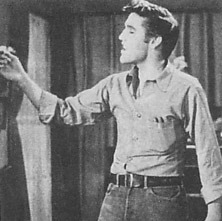
March 27th, 1956: Elvis with veteran actor Frank Faylen. The scene Elvis did with Faylen was this one below (no footage, sadly, but there's pictures from his test on the video, following the scenes):
youtube
Allan Weiss was not as impressed with the dramatic part of Presley’s test as he was with the musical portion. “Elvis played the rebellious younger brother with amateurish conviction — like the lead in a high school play. His performance was believable, but lacked the polished subtleties of a professional.”
On the other hand, after viewing the acting part of the test, Paramount dramatic coach Charlotte Clary thought Elvis might have a future as an actor. “The boy is a natural,” she judged. “There’s nothing fresh or obnoxious about him at all.”
Source: http://www.elvis-history-blog.com/elvis-screen-test.html
On March 28th came Presley’s third screen test, the King lip-synched to “Blue Suede Shoes” in front of a set of rather shiny curtains. It was a wild audition, with Elvis giving his trademark gyrations and sneer. He was doing what he did majestically already, so he enchanted the screenwriter Allan Weiss.
youtube
“The transformation was incredible. We knew instantly that we were in the presence of a phenomenon; electricity bounced off the walls of the sound stage. One felt it as an awesome thing — like an earthquake in progress, only without the implicit threat. Watching this insecure country boy, who apologized when he asked for a rehearsal as though he had some something wrong, turn into absolute dynamite when he stepped into the bright lights and started lip-synching the words of his familiar hit. He believed in it, and he made you believe it, no matter how ‘sophisticated’ your musical tastes were.”
— Allan Weiss, Screenwriter.
This reaction may have set Elvis' fate in Hollywood, among other things (money-seeking, as naturally any company would be bound to be), but up until then as far as EP knew he would act in a non-musical role, so this kept him thrilling. Elvis' fans, as always, were very supportive, and couldn't wait to watch the rock star on the big screen.
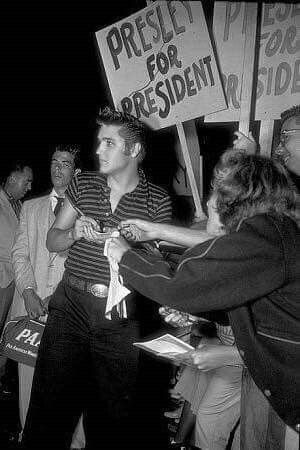

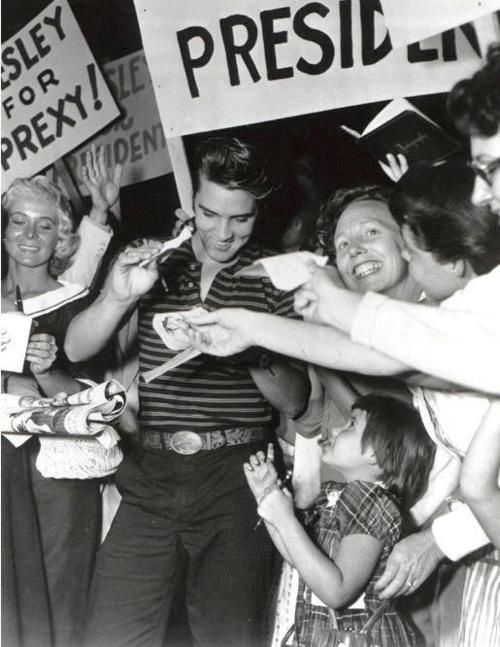
(Above) August 16, 1956: Elvis left Memphis on an American Airlines flight for Los Angeles where he reported to 20th Century Fox for pre-production meetings for his first movie. The fans greeted him at the airport, holding "Presley for President" posters. 🥹


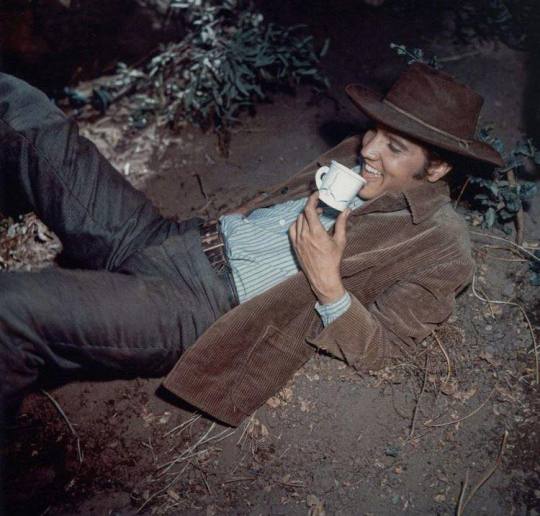
As the production for Elvis' first movie begun, things were... different. The studio/producers eventually altered the script to include 4 songs Elvis would sing, 'Love Me Tender' being one, and they altered the title of the film too — originally entitled 'The Reno Brothers' — so it could follow the name of that one Elvis song.
This turned things bittersweet to Presley. Elvis did not want to sing on the screen and he confessed to his close friends how upset watching as they promised him one thing and ended up eventually changing plans (to profit on his music career) without him being able to do anything about it (June Juanico was one girlfriend he vented about this).Top this to the fact that Elvis indeed preferred his part to be a little more to the 'bad boy' side, and Clint Reno was everything but a bad boy, and you can imagine how Elvis felt about his first movie, not fully satisfied after all. Still he kept hopeful about his acting career could evolve and he could eventually become a serious actor. This hopeful mood followed his next films, but it did not last long.
Either way, the premiere for 'Love Me Tender' was a huge success.
Arlene Cogan, a young fan that not much after this would become friends with Elvis, shared in her book "Elvis, This One's for You" that when she went to watch the movie she spent the whole day rewatching it in the theater, over and over again. She says that no one seemed to leave the room.
"When Elvis appeared on the screen, everyone screamed so much that you couldn't hear him."
— Arlene Cogan on her book "Elvis, This One's for You".
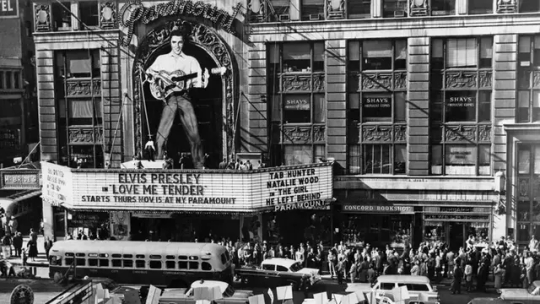
On the day 'Love Me Tender' premiered in the theaters on November 15, 1956.

November 21st 1956. 1413 Main Street, Columbia, S.C., Richland County. A crowd of teenagers in the lobby of the Palmetto Theater for the opening of the Elvis Presley movie Love Me Tender.
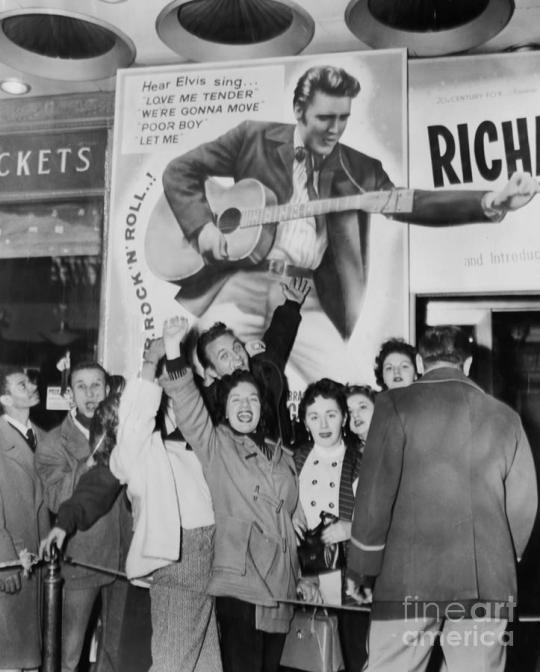
November 16, 1956: Fans wait in line to see Elvis Presley in 'Love Me Tender'.
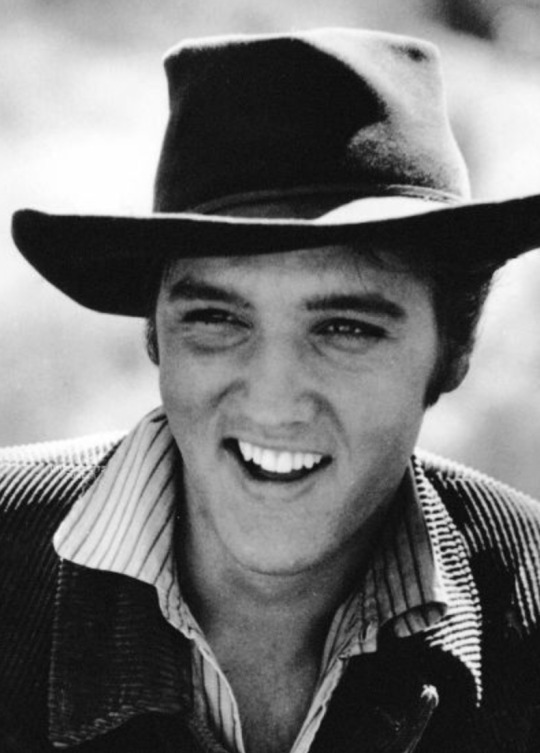

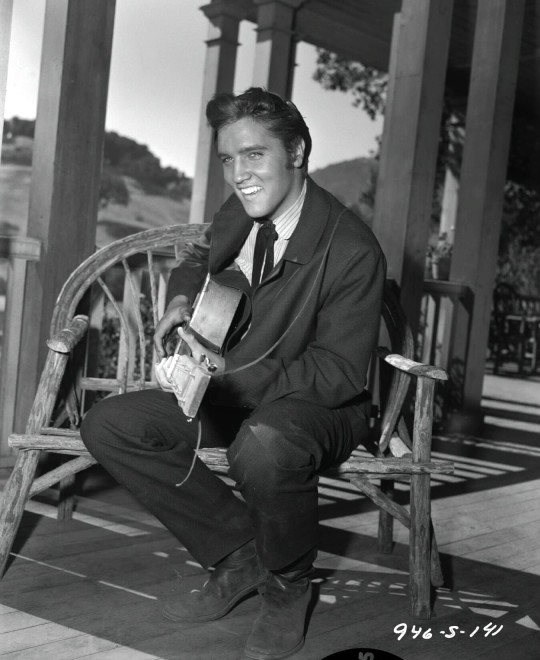
Even so Elvis' start in Hollywood wasn't quite as he expected (in personal satisfaction wise), Presley did it great as a sweet country boy, Clint Reno. Some critics didn't go for him and harshly bashed his acting skills (much going with their previous opinions on Elvis as a performer and the controversial about his 'antics' on the stage in the 50s), as much as some supported his initial kick off, but one thing's for sure: the young audience adored him regardless either if he was a "bad boy" onscreen or not. ♥
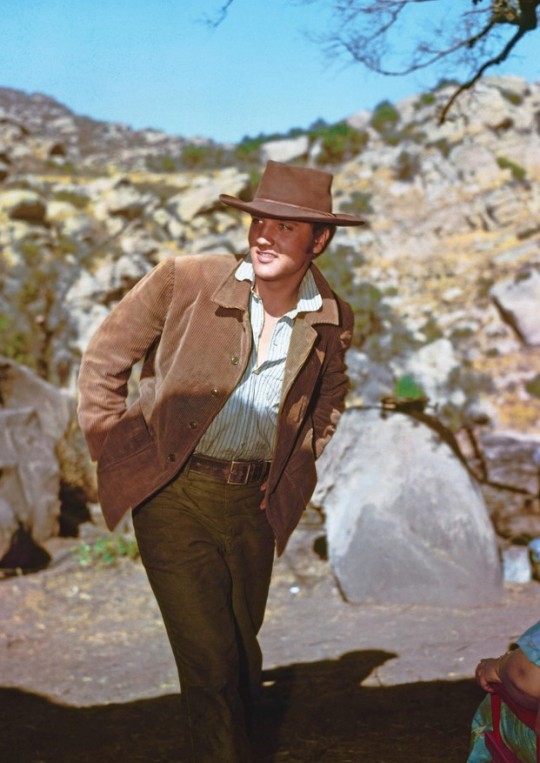
Elvis on "Love Me Tender", 1956.
#love me tender#the reno brothers#elvis presley#clint reno#elvis#1956#50s movies#classic hollywood#old hollywood#classic icons#classic cinema#classic movies#50s films#lloyd shearer#parade magazine#magazine articles#elvis magazines#james dean#marlon brando#hollywood stars#Youtube#the rainmaker#cynthia o'neal#allan weiss
18 notes
·
View notes
Text
Googling what P-Diddy did cause of Sage and oh my god the UK press are capable of clickbaiting Prince Harry in anything arent they
#for context he got mentioned as a famous guy p diddy met and it spawned a whole ass article#at it somehow was the second recommended article#ahead of other accusations associated#and 50 cent saying hes dropping a docuseries on this man
13 notes
·
View notes
Text
Linguistics post!!
I'm sure it'll come as a surprise to everyone, but just about all my fantasy short stories take place in the same universe (it was inexplicably named Triworld by my younger self, and I haven't seen fit to change it since) across different times! I've been cultivating the little universe since I was 6, and it's basically become a sprawling mess.
Nonetheless, I want to set the lore down in stone, once and for all. And where better to start than with the linguistics?
Now, in modern Triworld, there are 4 main languages. They're generally divided by species, though there is some geopolitical leakage.
Trade-tongue (occasionally known as humani, Lingua Franca of everywhere except the Cescere/Syvniko)
Spirit/Fae (more commonly known as Cescereli)
Angelic/Demonic/Sirenic (generally called Angelic)
Ghoulish (also used by the nearly extinct shifters)
Trade-tongue:
You can operate on the assumption that Trade-tongue will be considered the default. The Humans, and to a lesser extent, the elves, use it exclusively. It is a mish-mash of a variety of different languages, from the days when different tribes worshipped different gods, with a great deal of influence from the now-archaic Elvish tongue. To a non-native speaker it will have a rolling cadence, with rounded words than the a spirit or ghoul would be comfortable with.
Interestingly, it contains some Greek/Latin prefixes in it, as seen by the countries Luxatia and Nyctomachia. (As a writer, it's because younger me loved her fancy language and never saw what a pain it would be for older me. The lore reason is that a Wanderer found his/her way into Triworld and messed up human linguistics in the process)
Cescereli:
Oh dear. Where do I even begin? This is by far the most detailed of my languages, and I would go so far as to call it a conlang. It operates on a character based format, similar to Chinese, and any depictions of Cescereli in my writing will be limited to phonetic transcriptions until I work out how to input made-up symbols into my writing.
Sentence structure is fairly variable, given that it has dozens of dialects, and some linguists have (very hesitantly) suggested that the linguistic drift might be so great that they ought to be considered several languages. The spirits, being a very United people, cannot and will never accept that, and the Fae's pidgin of trade-tongue and Cescereli is remarkably faithful to what is known as the Imperial dialect.
Cescereli uses a great deal of compound words, with each character being seperated by a ' or a -, or nothing at all, depending on the type of character in use. Something that would incorporate all three might be Cescere'nari-ilra, which is what spirits use to refer to mountain elves.
Directly translated, it would mean Our (ces) Mountain (Cere) Long-eared (nari, also a term used to refer to donkeys and rabbits) Mortals (ilra, with ilre being the immortal version). As you can tell, it is my darling. I could write its own post about it, and about the spirits in general)
Now, the elves, being geographically close to the spirit Capital, share quite a bit of vocabulary with the spirits, so spirits often find themselves shocked to hear Cescereli within trade-tongue. Spirits are fiercely protective of their language and insist on speaking it amongst themselves. Any being that wishes to work amongst spirits, or to a lesser extent, Far, has to have at least some modicum of Cescereli proficiency.
To a non-native speaker, it sounds like a teakettle hissing. This has been the source of rage for many spirits.
Angelic:
A dot-based language, it has the greatest tonal variation of any tongue on Triworld. Angelic requires the speaker to transverse as far as three octaves across a single sentence, leading it to be known as song-tongue colloquially.
Few species have the vocal chords to actually pronounce the words, with sirens, angels, demons, and spirits (who refuse to speak it due to an ancient rivalry with the sirens) being the only ones truly able to speak it fluently. The remaining species, when trying to learn Angelic, use a variant known as Lesser Enochian (another remnant of a long-gone Wanderer), which has far less warbling.
It is known as the most beautiful language in existence, and sirens take great pleasure in reciting Angelic poetry to honoured guests. Demons, on the other hand, delight in their dialect, Infernal (which has its own set of sub-dialects), as a method of mocking those without sufficiently high ranges of hearing to catch their words. Angels prefer pretending they do not have to share their language with two other species, and insist their dialect is the only 'true' one.
Ghoulish:
As languages go, Ghoulish is a mess. It has a basis of shifter-speak, with a dash of Cescereli, some elven, a remarkable amount of Goddish, vampiric to taste, and what might actually be the original human tongue, or perhaps ancient ghoulish.
It came of the Lich-Queen of Ceredell (yes, you do note the Cescereli Cere being mixed with the trade-tongue Dell) wanting to cut her ties to humanity. As a tribute to the people who visited her coronation (I'm currently writing this story up now, so spoiler alert for the Lich-Queen!), she named her capital after the spirits, made shifter-tongue the national language, devoted a quarter of every mortal city to the Gods, industrialised the blood-substitute industry for the vampires, and offered free and safe immigration for all the above species.
The result was... This. Ghoulish growls and snaps and whistles and bounces of the walls like it's high on booze-berry. It technically uses the trade-tongue alphabet, but with each letter having indentations and inflections, it might as well be its own language.
Well, that's about it! I'm sorry to anyone who made it this far, that's 5 minutes of your life that you're not getting back. I could talk endlessly on my world building, but I try to obey the principle of Show, not Tell. Next up, Geography!!!
#wordbuilding#writeblr#my writing#writing#creative writing#writerscommunity#writing community#fantasy#spilled ink#writer stuff#conlang#fictional language#Me when I write articles about my writing instead of actually finishing my 50 wips#Triworld
12 notes
·
View notes
Text
#intriguing tags op#if you ever feel inclined to post your list of gabinius articles - i am interested. @garland-on-thy-brow
I DO feel inclined!! There are never enough people to share an interest with over dead dudes who are not too bad but also not that great 👌🏻
So for the list, here are the articles I've read as of yet:
"The Trials of Gabinius in 54 B.C.", Elaine Fantham : a nice read although tbh I thought the structure a little confusing at times -also due to my limited knowledge of the political landscape in those years. It delves into the conduct of the trials, the violence surrounding it and Cicero + the triumvirs (mainly Pompey)'s involvement (btw it's the article which contains the "Pompey-watching" phrase). In any case, who doesn't love reading about Cicero being dragged kicking and screaming into defending a guy he has 0 respect for.
"The Career of Aulus Gabinius", Eva Matthews Sanford : really fun to read and quite easy too as it's structured chronologically. Describes the evolution of Gabinius's career up to the trials (and very rapidly the events afterwards). The writer also regularly weighs in on the validity of Cicero's attacks on Gabinius's character, which is nice.
Now for the ones I haven't read yet but am interested in:
"The Role of "Amicitia" in the Career of A. Gabinius (Cos. 58)", Richard S. Williams : focuses on the political relationship between Gabinius and Pompey
"Rei Publicae Causa: Gabinius' Defense of His Restoration of Ptolemy Auletes", same : probably overlaps a little with the Career article but it seems to dive a little deeper into Gabinius's actions as governor and the political situation in Egypt
"Cicero's Support of the "Lex Gabinia"", Allen M. Ward : aka the article Cicero Really Doesn't Want You To Read. The author gathers arguments to support another scholar's theory that Cicero did act to favour the passing of the lex Gabinia.
Also I wanna add a French article on Cicero's "showmanship" in the first four Philippics ("L'art de la mise en scène dans les quatre premières Philippiques", Marie-José Kardos) which mentions Gabinius only once but in a way that is partly responsible for my interest in him:

"Similarly [to the way Cicero insists on how the vices he describes can affect the government], he focuses on other defects relating to the private sphere: romances, scandalous liaisons, debauchery of one's youth. This type of accusation is also quite common. Cicero practised it against Catilina, against Clodius, against Piso and Gabinius."
#cassius dio has a full account of the trials i believe but i haven't looked that up yet#funny how most of these articles are 50% about cicero. this guy tends to cannibalize every other info we may have on his political enemies#i love you but please please close your mouth sometimes.#anyway hope this helps! i have no certainty that i will read those other articles (except the short allen ward one) bc at this point it'#turning into procrastination for what i'm actually supposed to do BUT they looked interesting!#my posts#the romanity#aulus gabinius#ringletted dude
29 notes
·
View notes
Text
Wish me luck. Trying to research 1940s American culture so I can make a video essay on potential queer coding with Plastic Man
#most articles im finding are abt the 50s though so it might take a minute#meffy rambles#plastic man#plas posting
19 notes
·
View notes
Text

i want to read but i’m eyes hurt
12 notes
·
View notes
Text
I read this aloud to Charlie and we both wondered whether or not anyone’s actually told Archer magazine that they don’t actually have to be a queer magazine.

It’s not like the community is forcing them to write about queer sex at gun point. But to be fair, if we were… they would probably publish more stories about queer sex…
#I’m thinking back to the time I pitched to them and only then realised… I’m too poor to write 800 words for $50#I know they’re a small publication but $50… it’s just enough money to really rub in how much you’re not being paid for your time…#like that’s maybe half what a week’s groceries cost?#anyway all that to say. you get the content you pay for. if you wanna publish articles for $50 get ready for: oops all middle class writers#leafing through the queer magazine searching for the centrefold only to find a story about one person’s self care journey during lockdown#this is so funny it’s just. oh my god. they’re such a small mag I shouldn’t dunk on them but they’re all we have and it’s.
18 notes
·
View notes